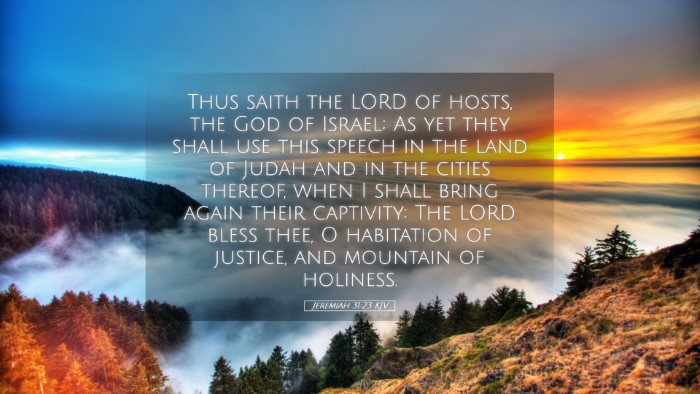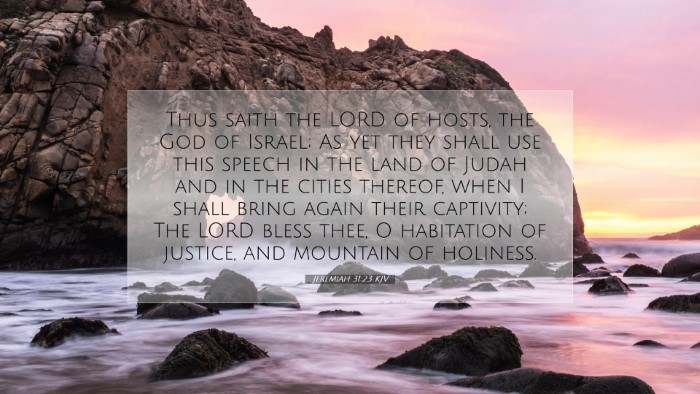Commentary on Jeremiah 31:23
Jeremiah 31:23 states: "Thus saith the LORD of hosts, the God of Israel; They shall yet say this word in the land of Judah and in the cities thereof, when I shall bring again their captivity; The LORD bless thee, O habitation of justice, and mountain of holiness." This verse plays a significant role within the larger context of Jeremiah's prophetic messages regarding restoration and hope for Israel. Herein, we explore its implications through a synthesis of insights from several public domain commentaries.
Contextual Overview
The book of Jeremiah is primarily a compilation of prophecies delivered during a tumultuous period in Israel's history. It addresses the impending destruction of Jerusalem, the consequences of sin, and the promise of restoration. Jeremiah 31, specifically, signifies a turning point, where the tone shifts from devastation to hope.
Understanding the Captivity
According to Matthew Henry, the mention of "bringing again their captivity" refers to God's promise to restore those exiled in Babylon. It emphasizes not just a physical return but also a spiritual rejuvenation of God’s people. He underscores the assurance that God will once again bless His people as they return to their homeland. This restoration includes both the people’s return and a reaffirmation of their covenant relationship with God.
The Blessing Over Judah
Albert Barnes highlights the phrase "The LORD bless thee, O habitation of justice, and mountain of holiness," signifying God's favored presence among His people. The term "habitation of justice" indicates a place where righteousness dwells, indicative of a society that adheres to God’s commandments. The "mountain of holiness" symbolizes stability and the elevation of God's holiness in Jerusalem. This blessing is not merely verbal but is seen as an active presence of God bringing peace and security to the land.
Implications for the Remnant
Adam Clarke discusses the implications of this promise for the Jewish remnant that remained after the Babylonian exile. He notes that the verse goes beyond local significance and addresses future generations, signifying a broader restoration of Israel culminating in the Messiah. Clarke asserts that this prophetic blessing implies confidence in the restorative power of God, culminating in Israel's eventual spiritual revival.
Theological Insights
This verse encapsulates key theological themes that resonate across time, particularly for pastors, students, and theologians. Here are some core reflections drawn from the commentaries:
- Divine Sovereignty: The affirmation that God will act to restore Israel underscores His sovereign control over history and the nations.
- Covenantal Faithfulness: The promise of restoration signifies God's unending commitment to His covenant with Israel, highlighting the idea that even amidst judgment, grace prevails.
- Hope in Adversity: This scripture serves as a beacon of hope, reminding believers that trials and tribulations are not the end but part of a greater narrative of redemption.
Practical Applications
For modern readers, particularly those involved in pastoral ministry or theological studies, Jeremiah 31:23 offers profound lessons:
- Encouragement in Ministry: Pastors can draw encouragement from this promise that God is actively working to restore His people, even in contemporary contexts of decline or despair.
- Focus on Justice: The call for Judah to be a "habitation of justice" challenges contemporary church communities to pursue righteousness and advocacy for the marginalized.
- Hope for the Future: It serves as a reminder of the ultimate hope found in Christ, as believers look toward the eschatological fulfillment of God's redemptive promises.
Conclusion
Jeremiah 31:23 is a powerful declaration of restoration and blessing that carries implications for both its original audience and contemporary believers. Anchored in themes of divine sovereignty, covenant faithfulness, and hope, the verse invites an understanding of God's ultimate purpose for His people. Through this blend of prophetic insight and practical application, ministers and scholars are encouraged to uphold the message of hope that scripture perpetuates. As they navigate their faith journeys, they may take solace in the assurance that God, in His mercy, continually works towards the redemption and restoration of His creation.


